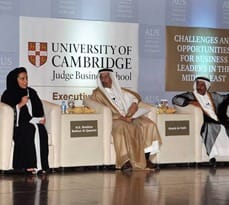Planning for a world without oil and gas, succession planning in family businesses, education reform and instilling a culture of risk-taking among young people were among the themes emerging when the University of Cambridge Judge Business School launched its new Middle East Leadership Research Centre this week.
Business leaders from across the region gathered in Sharjah for the launch, where they discussed broad themes around entrepreneurship, gender balance in the workplace, adding value through ethical practices, diversification in family businesses and Islamic finance. His Highness Sheikh Dr Sultan Bin Mohammad Al Qassimi, Ruler of Sharjah, attended the launch held at the American University of Sharjah.
One of the major themes to emerge was the future of education, with delegates reflecting on how to equip the burgeoning youth population with an education aligned to the profound changes happening across the Middle East, as well as how to offer new business ventures the right educational support to give them the best chance of succeeding.
A keynote address was given by Tirad Mahmoud, CEO of Abu Dhabi Islamic Bank (ADIB), who shared his insights on banking and finance as it has developed and taken shape in the region.
Among the other speakers, Khalid Al-Falih, President and CEO of Saudi Aramco, spoke about the challenges the Gulf faces, including dependency on oil and gas. Al-Falih said that, while the area was currently experiencing one of its longest periods of growth, efforts to build sectors other than oil and gas by governments throughout the region were vital. He said: “Generational sustainability is the key; we need to plan for a world without oil and gas.
Her Excellency Sheikha Bodour Bint Sultan Al Qasimi, Chairperson, Sharjah Investment and Development Authority, reflected on the unprecedented growth in young people that the Middle East is experiencing. She stressed the need to nurture in this generation a culture of entrepreneurship and innovation, with the education system requiring reform to reflect the needs of the times and create an environment where independent thinking and questioning is encouraged.”
The Middle East Leadership Research Centre aims to fill a void in research in the region, working with partners to build a repository of region-specific research and learning that avoids the current necessity of relying on materials derived from US and European contexts unsuitable for the Middle East.
The Centre will operate virtually, without a physical campus, working with partners across the region in the public and private sector.
Dean of Cambridge Judge Business School Professor Christoph Loch said: “We want to engage, in the context of executive education, with our friends and partners in the Middle East to really understand the challenges they face and work with them on creating new solutions, which are right for them individually, and which can also be shared with other organisations. Companies can come with problems and the research centre will look for solutions.”
Cambridge Judge faculty who will spearhead the research were also present at the launch and include Dr Jane Davies, University Lecturer in Operations Management; Dr Kamal Munir, Reader in Strategy & Policy and Head of the Strategy & International Business Group; and Peter Hiscocks, CEO of Cambridge Judge Business School Executive Education.
Hiscocks said: “We were delighted to launch our new centre amid such high calibre discussion and idea-sharing. We are deeply grateful to our distinguished guest speakers and all our guests from the region, who so generously gave their time and expertise today to point us in the right direction in setting the agenda for the Middle East Leadership Research Centre.”


